Bang & Olufsen Beoplay Portal: Practically perfect in every way
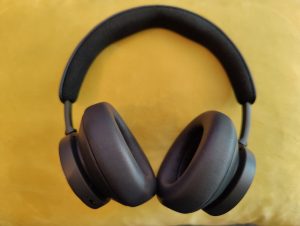

I can’t remember the name of the first gaming headset I bought, but it was, to put it mildly, a hot mess. A garish affair, with horrifically aggressive angular edges and brightly coloured accents. It was the sort of device a 12-year-old would proudly wear, flossing over the lifeless bodies of their Fortnite rivals.
Now older and wiser, my headphones of choice would be much simpler. A treat for my ears; a pair that’s comfortable to wear for hours, and don’t make me want to gouge my eyes out when I look at them.
Enter the Bang & Olufsen Beoplay Portal.
Rocking a Designed for Xbox Limited Series partnership, the Portal feature Microsoft’s proprietary 2.4GHz Xbox Wireless tech, which offers instant pairing and full Dolby Atmos support with Xbox consoles and PCs rocking an optional Xbox Wireless adapter. In addition, they serve up Bluetooth 5.1 with aptX Adaptive for Android users, along with the option for wired use courtesy of the included 3.5mm jack and USB-C audio cables.
Combined with multiple microphones for voice clarity and active noise cancellation, and an accompanying Bang & Olufsen app that lets you tweak a plethora of settings and features, the Beoplay Portal – on paper at least – appear to be the only pair of headphones you’ll ever need for work and play.
Bang & Olufsen Beoplay Portal price and availability
Set to release on 29 April for £449 / €499 / $499 / AU$999 on the Bang & Olufsen store, these gaming headphones are aimed at the more mature, classier gamer, who’s after a quality audio experience in a high-end headphones package.
Bang & Olufsen Beoplay Portal design – Classy, elegant and beautiful, with all-day wearability to boot
- Premium materials feel super-luxurious
- So light you’ll forget you’re wearing them
- Incredibly comfortable, even for larger ears
It will come as no surprise to hear that the Portal look and feel as premium as their price tag and Bang & Olufsen DNA suggest. The first thing you’ll notice when picking them up is just how incredibly light they are. At 282g, they feel much airier than they look. While I normally like the hefty feel of expensive electronics, headphones are an exception, since comfort is prized above all else – especially when it comes to something that will be hugging your head and ears for hours each day.
Build quality is robust, with luxurious materials used throughout. From super-soft lambskin leather-covered memory foam ear cups, to the padded fabric headband and metal build, these headphones ooze quality. I particularly like the machined aluminium discs on the outer of both ear cups, which reflect light in a rather pleasing way.
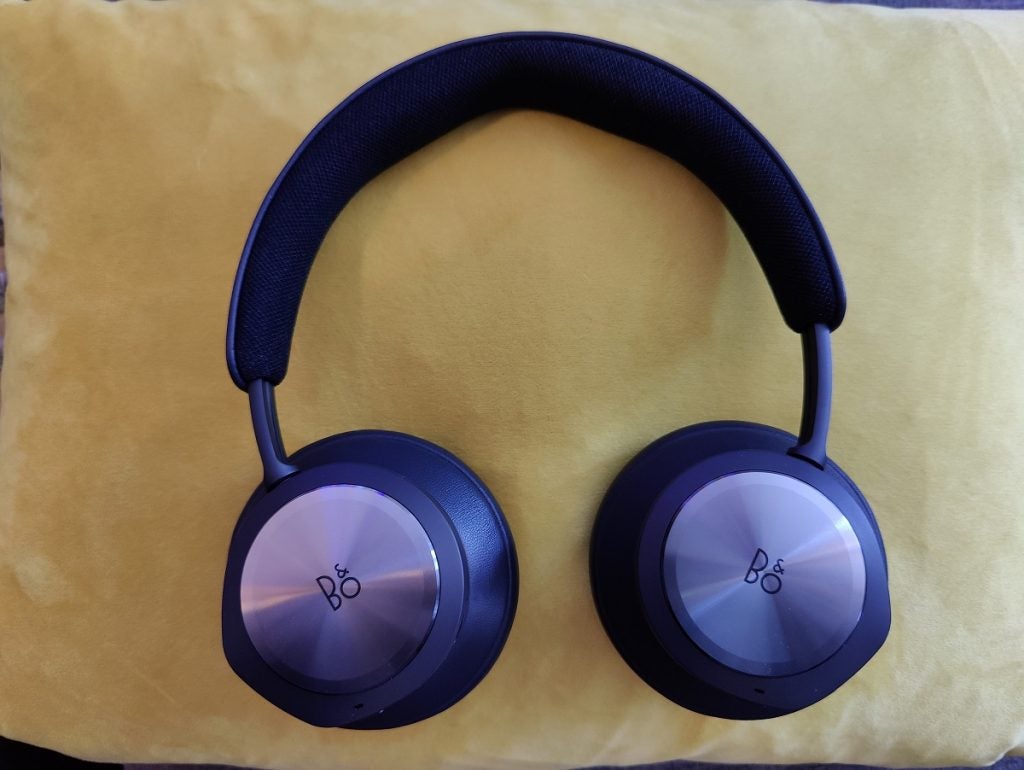
The upshot of all this is a pair of headphones that I can genuinely wear for hours without discomfort. As someone who traditionally hates over-ear headphones due to my bigger ears, the Portal are an absolute godsend. Beyond their lightness, small details such as the rear bulge of the ear cups to better cover and rest on your ears show the level of thought that has gone into wearability. It’s very much appreciated.
Another key point is the fact that, unlike almost every other gaming headset, there’s no unsightly microphone arm or ‘boom mic’ to be seen. Instead, the Portal make use of built-in microphones, which have been carefully tuned to pick up your voice, while cancelling out distracting background noise. As a result, the Beoplay Portal look like a regular pair of premium headphones, and it makes for a far more pleasant, freeing experience.
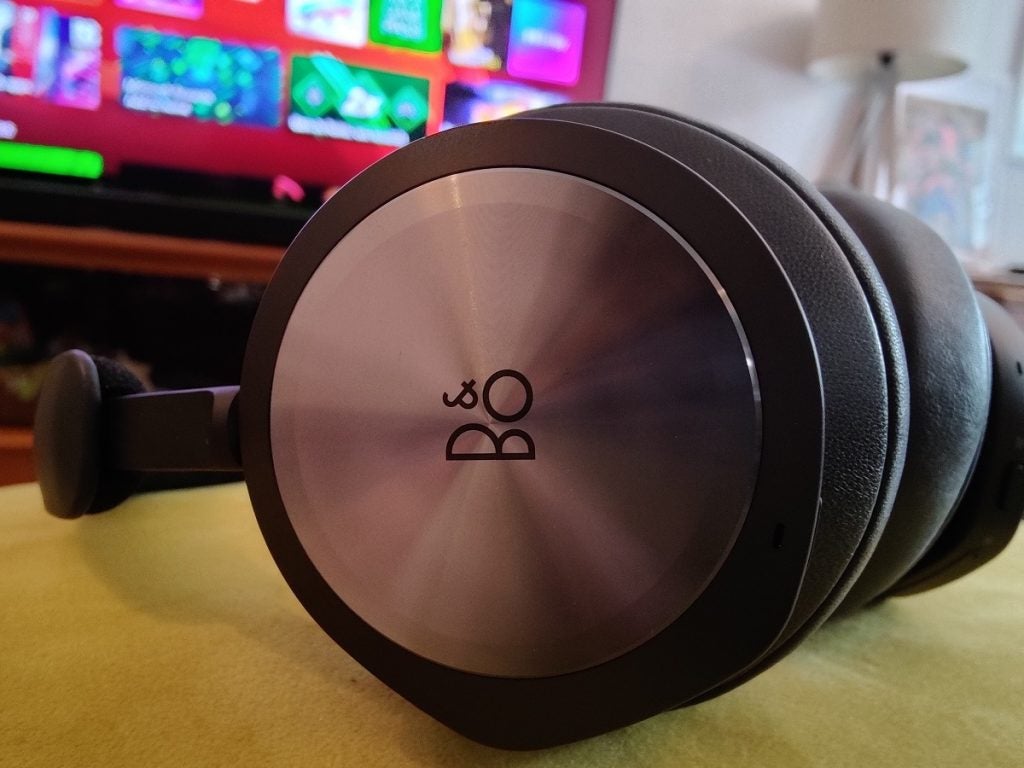
As such, unintrusive eating, drinking, and participating in Zoom calls without feeling like an air-traffic controller was a genuine breath of fresh air. While my regular pair of gaming headphones tend to get called out for being excessive on Zoom, no-one batted an eyelid while I was wearing the Portal.
Colour-wise, the Portal are available in three options: Black Anthracite (our review unit), Grey Mist (a white/grey affair), and Navy. The latter combines a fetching dark blue with gold-like aluminium discs and looks particularly classy in photos.
My only real gripe is that there’s no case included – which, at this price, seems rather cheeky. Especially since you’ll want to do everything you can to keep the Beoplay Portal looking its elegant best.
Bang & Olufsen Portal features – Rammed to the hilt with connectivity and app-enabled options
- Compatible with almost everything under the sun
- B&O app offers a handy way to control the settings
- No skip/repeat music shortcuts
More than just a pretty face, the Portal are packed with software and connectivity features that should meet any challenge you care to throw at them.
Kicking off with the physical controls, you have a touch-sensitive slider on each side, with the right controlling the volume, and the left controlling the ANC/awareness levels in regular mode, or game/chat mixing levels in gaming mode. These sliders work well, in the sense that I never found myself frustrated at a lack of response.
However, I find them lacking in any texture or feedback, so it’s difficult to accurately make finer-level adjustments. Some haptic feedback would fix this, but probably wouldn’t be worth the expense, weight, and trade-off with battery life.
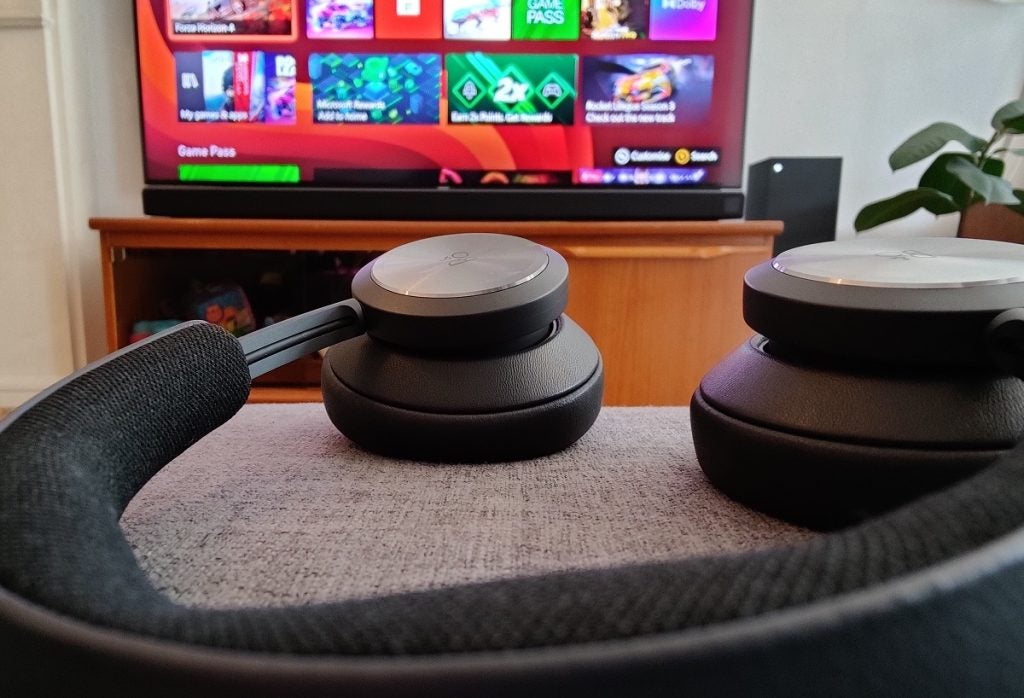
On the right is the power/Bluetooth pairing button, while the left has a dedicated Xbox Wireless button, along with a USB-C port and a 3.5mm headphone jack connection. The aluminium discs can be double tapped to play/pause music or adjust the ANC so that you can hear your own voice.
While this works well, it’s a shame there’s no option to skip or repeat tracks. As a serial song skipper/repeater, this is a massive omission for me. Thankfully, it can easily be fixed with a software update, so I’m hoping enough users will kick up a fuss to warrant an update.
The Beoplay Portal has two modes – a regular mode for Bluetooth and 3.5mm jack connections, and a gaming mode that kicks in when connected via an Xbox Wireless connection or USB-C. The Bang & Olufsen app automatically detects the mode, with the interface changing accordingly, to present game-specific EQ options, for example, offering a choice between FPS and RPG.
Setup through the app is simple enough, and pairing up with an Xbox console (everything from the original Xbox One onwards), or a PC with a USB Xbox Wireless adapter, is as simple as holding down the pairing button for a few seconds.
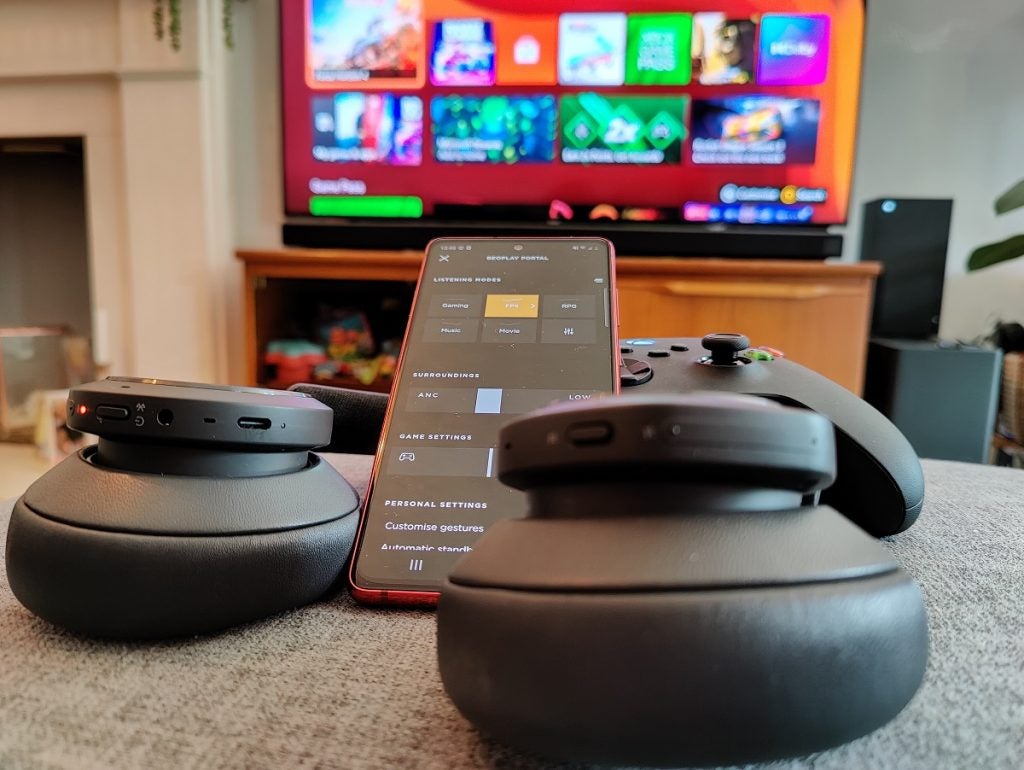
When connected via Xbox Wireless or USB-C in gaming mode, you automatically unlock Dolby Atmos for Headphones, which would otherwise be a paid app. You’ll need to download the Dolby app from the Windows Store on either PC and Xbox, and it will automatically detect the Portal. You can then change the different EQ settings or create your own via the Dolby app. However, it’s far easier and more convenient to use the Portal’s app to do the job, since it won’t interrupt your gameplay.
The app also lets you fine-tune the level of ANC and awareness mode, as well as adjusting the levels of game audio and chat audio, ensuring friends aren’t drowned out by any in-game explosions/insults from over-excited 13-year-olds.
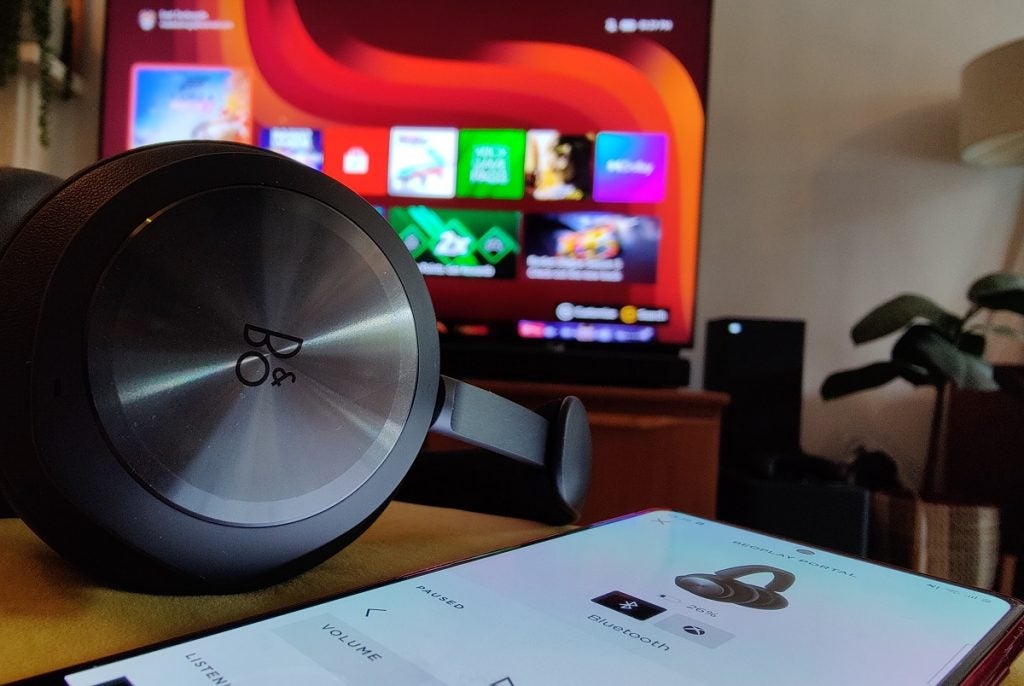
The USB-C cable doubles up as a charging cable and is included in the box, along with the 3.5mm audio cable. Charging is fast and snappy, and I have no complaints with how long the Portal lasts either. It’s rated for 12 hours when connected to both Xbox Wireless and your phone with ANC turned on, and 24 hours through a simple Bluetooth connection to your phone.
These battery claims match up with my experience. One particularly long six-hour gaming marathon consumed a little over 50% of the battery, so you could get two very heavy days of gaming from a single charge. A more typical use case, though (for me at least), is listening to music purely via Bluetooth while trying to focus on work or walking, which adds up to a few hours each day. Throw in the odd hour of gaming, too, and I found I could push the Beoplay Portal to around four days on a single charge – although your mileage may vary according to your use.
Bang & Olufsen Portal sound quality – Crisp, punchy and customisable, the Portal sound even better with Atmos enabled
- Excellent sound across the board
- Dolby Atmos breathes life into games, music and movies
- ANC and invisible microphones work well, although the Own Voice feature could be louder
Before we get into the Atmos performance, let’s cover the basics. The Portal sound superb over any connection and produce delightful results with every piece of music thrown at them. From bass-thumping trance tracks to more nuanced, delicate jazz and everything in between, sound is tight and balanced, with lows, mids and highs all present and accounted for, without anything being thrown off-kilter.
It’s a slightly different story with games, however. Without Atmos, things are muddier, with the different ranges blurring together more noticeably. Running around a map in Call of Duty: Black Ops – Cold War, for example, can become overwhelming, with footsteps, environmental noises, explosions and gunfire all seemingly pouring into your ears at once.
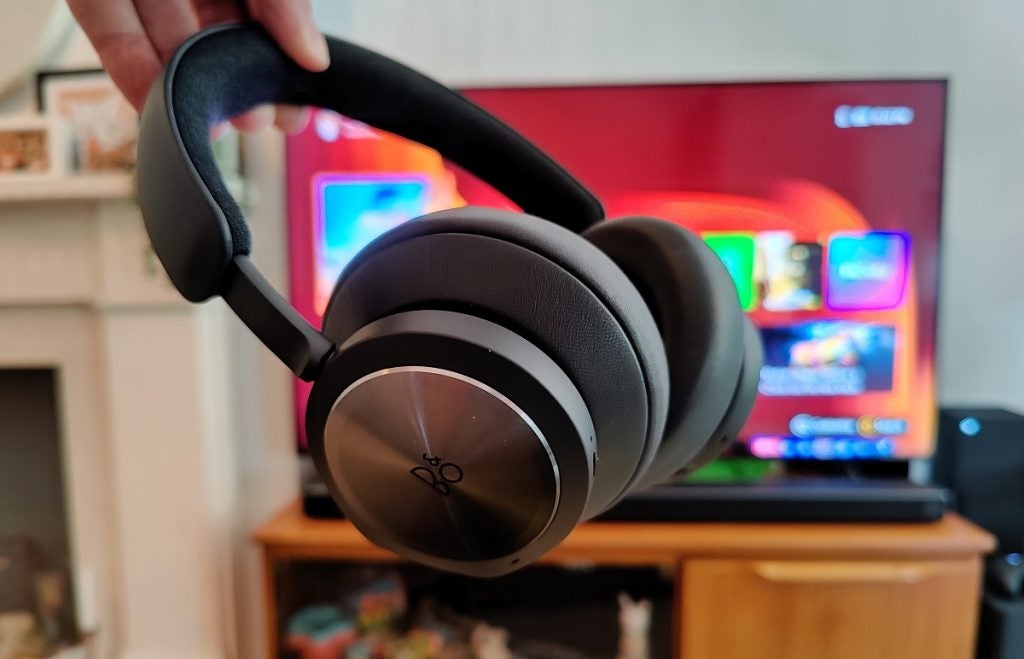
The same experience is seen with less hectic games, too. Tony Hawk’s Pro Skater 1 + 2 has a legendary soundtrack, but it sort of blurs together with the skating sounds and groans of pain my character regularly utters as I inevitably mess up trick after trick. This muddier gaming experience, by the way, is the same across other headphones I’ve tried too, so the Portal aren’t alone in this regard. It’s all moot though, because you’ll be turning Dolby Atmos on at all times – and when you do, your ears will be eternally grateful.
With Atmos on, gaming, movies and music enter another dimension. Things are simply… more spread out, both in terms of being in a wider and further area around you, but also in their levels. With music, this means I can pick out funky basslines better, while still hearing the chattering of a drummer’s hi-hat.
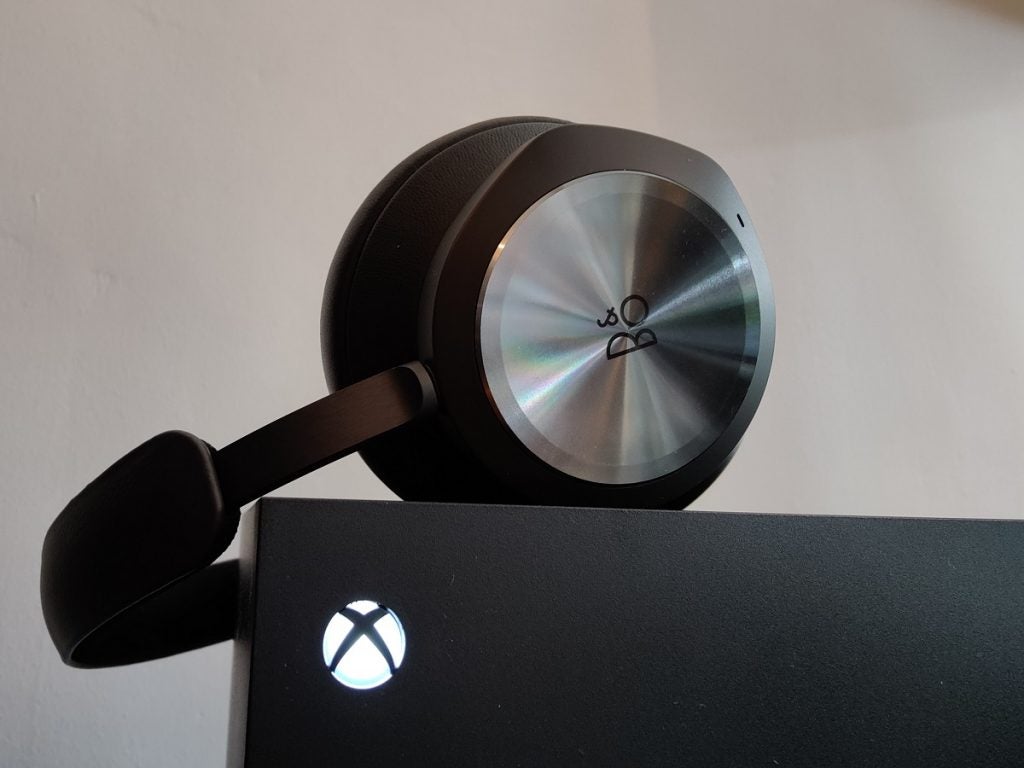
The difference in gaming is night and day. When Atmos is enabled, you can hear enemy footsteps in online shooters such as Black Ops. Bullet sounds pierce the air, clearly separate from the background sounds of battle as chaos rages around you. In Pro Skater, I can clearly hear the energising rebelliousness of Rage Against the Machine beam through, while the sound of my board zipping round a warehouse echo realistically around me. The Atmos performance here is, quite literally, a game changer.
Bear in mind, however, that Atmos only works using Xbox Wireless or USB-C connections. Regular Bluetooth and 3.5mm jack connections won’t support it, so while you could, for example, plug directly into a PlayStation controller and make use of the regular sound and built-in microphones, it will only be the standard listening experience on offer.
When it comes to adjusting the EQ settings in the app, the music preset has the most noticeable difference thanks to its increased bass, while the FPS preset pulls the mids down, letting you focus on important in-game queues. There’s also a custom EQ that’s responsive enough to let you create a preset that’s to your liking, which is a welcome touch for fans of tinkering.
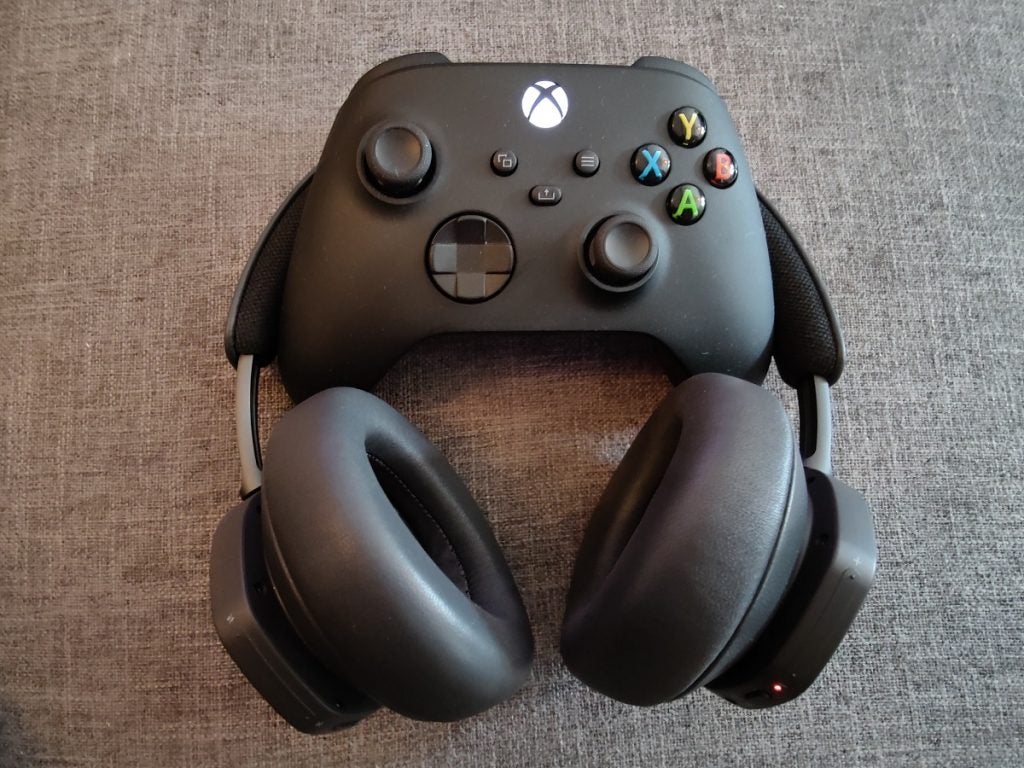
Things remain positive on the noise-cancelling front, too. The Portal do a very good job of blocking out the steady sound of outdoor traffic, and entirely removing the steady low hum of my indoor dehumidifier. It’s not quite enough to shut out the piercing wail of a crying baby, or someone having a loud conversation in the same room, but it does a great job taking the edge off – and with music or game audio, you’ll comfortably be lost in your own world.
However, the Own Voice function could be better. In gaming mode, this feature lets you hear your own voice back through the headset, which is useful for preventing you from shouting too loudly while your ears are being bombarded with explosions and bullets. It works well when things are silent, but as soon as any reasonable amount of in-game sound comes through, you’re not able to hear yourself. Again, I’d imagine that this is a relatively easy tweak that can be made via a future update, so unless you’re a serious streamer who’s looking to closely monitor your own audio, this shouldn’t be a deal breaker.
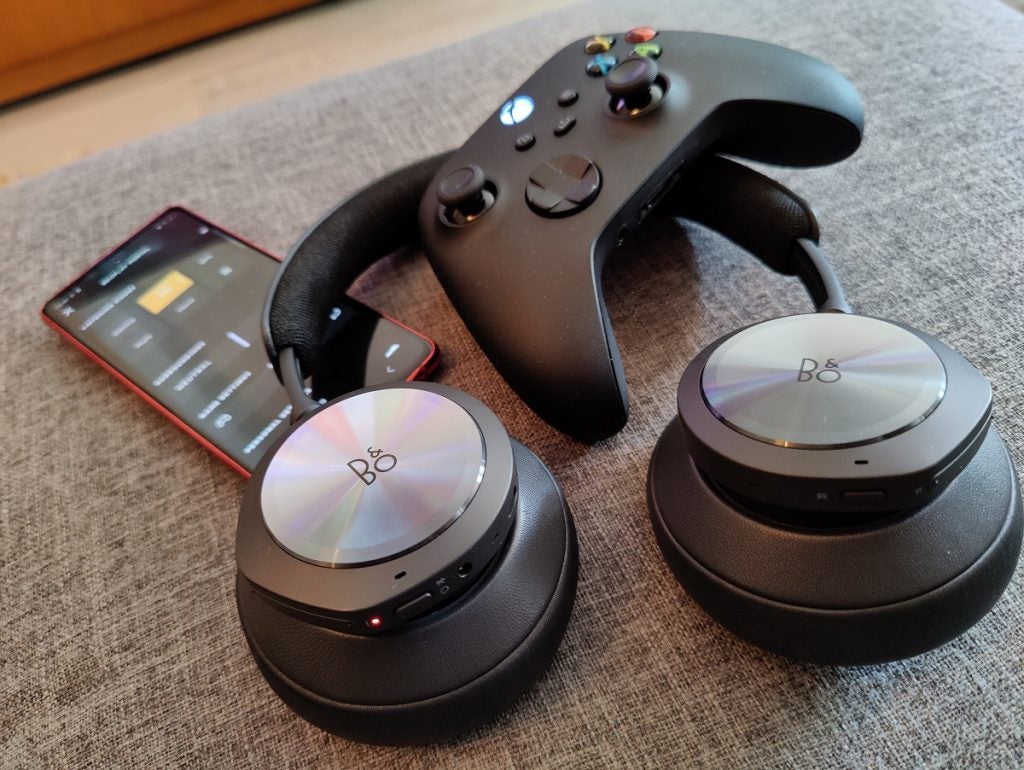
One thing I noticed that’s also worth mentioning is that the Xbox Wireless connection tends to drop off a lot more easily than a regular Bluetooth one. Going into the kitchen while chatting to a friend online resulted in sounds intermittently cutting out, while Bluetooth worked just fine. This isn’t a huge issue given the fact that you’ll be next to your PC or Xbox when gaming 99% of the time, but it’s still something to consider if you regularly stray far away from your console.
Lastly, we come to the built-in mic performance. I must admit, I was sceptical when I first heard about the virtual boom-arm microphone, and its promise of offering performance that’s close to that of a physical microphone positioned directly in front of your mouth. Despite my trepidations, however, I’ll happily admit that I was wrong.
Numerous people across phone calls, Zoom meetings, Discord and game party chat all said that my voice sounded loud and clear, with no complaints. The only snag was when having a conversation along a busy road on a windy day, which apparently resulted in quiet audio on my end – but this is something to be expected from any pair of headphones in those circumstances.
Bang & Olufsen Beoplay Portal conclusion
The Beoplay Portal are marketed as the ultimate premium gaming headphones. The fact there’s nothing quite like them out there, combined with the fact that they bring together premium materials and stellar audio, connectivity and microphone performance, show that Bang & Olufsen has nailed the brief.
Beyond gaming, though, I’ve found myself using the Portal for everything. Apart from Xbox and PC gaming, I use them to listen to Spotify when working or when I’m walking to the shops. I use them for Zoom calls and Discord. They get on with the job free of hassle or fuss, delivering good-quality audio across the board — and all without an ugly microphone or over-the-top gamer aesthetic in sight.
The Portal really do appear to be a set of headphones that can be used for almost everything – which, in a way, goes some way to justifying their price. With only a few minor niggles and buckets of praise, the Beoplay Portal should be on your headphone shortlist.
You should buy the Bang & Olufsen Beoplay Portal if…
- You’re an Xbox and/or PC gamer
Dolby Atmos’ magic is a joy to listen to and will add an entirely new dimension to your gaming experience.
- You want premium, grown-up design
The Portal looks nothing like a gaming headset; these headphones will blend in perfectly on your regular calls without drawing any attention to themselves. That’s not to say they’re bland, though. On the contrary, the Portal headphones are a beautiful bit of kit.
- You want one pair of headphones for everything
If you’d rather have a one-stop shop solution for gaming, calls, music and general use, the Portal will see you through without the need to own multiple pairs of headphones.
You should not buy the Bang & Olufsen Beoplay Portal if…
- You’re strictly a PlayStation user
There’s no point forking out this much money when the PlayStation 5 doesn’t support Dolby Atmos. You’d be better off spending less on a regular pair of headphones.
- You’re on a reasonable budget
At just under £450, the Portal headphones are a luxury, even taking in the fact that they fit multiple roles. You’re paying a premium for the materials and brand name – and if you’d rather not, that’s totally fine.
- You’re looking for a daily beater
If you’re after a pair of gaming headphones you’re happy to chuck in a bag then you’ll be better off spending less, freeing yourself from the worry of damaging an expensive pair of cans.
The post Bang & Olufsen Beoplay Portal: Practically perfect in every way appeared first on Trusted Reviews.
Source Trusted Reviews ,Home Appliances Reviews

No comments